I have a df that has one column in which the values are lists of values.
My intent is to split this column using some technique from here: Pandas split column of lists into multiple columns
However, for the column names I want to use each unique value from those lists of values.
To retrieve the unique values I have tried three different methods. Each one has failed with a different reason.
Is there a way to get Series.unique() when the values are a list of values?
My three attempts, with associated tracebacks:
1)
unique_vals = splitted_interests.unique()
Traceback (most recent call last):
File "C:/Users/Mark/PycharmProjects/main/main.py", line 68, in <module>
unique_vals = splitted_interests.unique()
File "C:\Users\Mark\AppData\Local\Programs\Python\Python37-32\lib\site-packages\pandas\core\series.py", line 1991, in unique
result = super().unique()
File "C:\Users\Mark\AppData\Local\Programs\Python\Python37-32\lib\site-packages\pandas\core\base.py", line 1405, in unique
result = unique1d(values)
File "C:\Users\Mark\AppData\Local\Programs\Python\Python37-32\lib\site-packages\pandas\core\algorithms.py", line 405, in unique
uniques = table.unique(values)
File "pandas/_libs/hashtable_class_helper.pxi", line 1767, in pandas._libs.hashtable.PyObjectHashTable.unique
File "pandas/_libs/hashtable_class_helper.pxi", line 1718, in pandas._libs.hashtable.PyObjectHashTable._unique
TypeError: unhashable type: 'list'
2)
unique_vals = splitted_interests.apply(lambda x: x.unique())
Traceback (most recent call last):
File "C:/Users/Mark/PycharmProjects/main/main.py", line 68, in <module>
unique_vals = splitted_interests.apply(lambda x: x.unique())
File "C:\Users\Mark\AppData\Local\Programs\Python\Python37-32\lib\site-packages\pandas\core\series.py", line 4045, in apply
mapped = lib.map_infer(values, f, convert=convert_dtype)
File "pandas/_libs/lib.pyx", line 2228, in pandas._libs.lib.map_infer
File "C:/Users/Mark/PycharmProjects/main/main.py", line 68, in <lambda>
unique_vals = splitted_interests.apply(lambda x: x.unique())
AttributeError: 'list' object has no attribute 'unique'
3)
unique_vals = splitted_interests.apply(lambda x: [y.unique() for y in x])
Traceback (most recent call last):
File "C:\Users\Mark\AppData\Local\Programs\Python\Python37-32\lib\site-packages\pandas\core\series.py", line 4045, in apply
mapped = lib.map_infer(values, f, convert=convert_dtype)
File "pandas/_libs/lib.pyx", line 2228, in pandas._libs.lib.map_infer
File "C:/Users/Mark/PycharmProjects/main/main.py", line 68, in <lambda>
unique_vals = splitted_interests.apply(lambda x: [y.unique() for y in x])
File "C:/Users/Mark/PycharmProjects/main/main.py", line 68, in <listcomp>
unique_vals = splitted_interests.apply(lambda x: [y.unique() for y in x])
AttributeError: 'str' object has no attribute 'unique'
